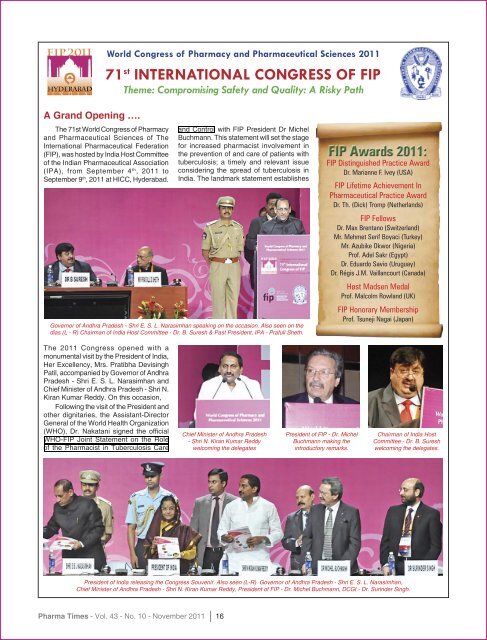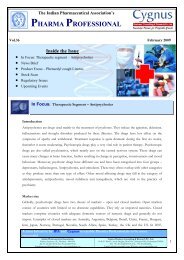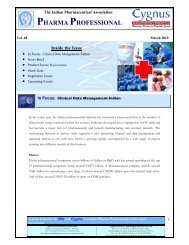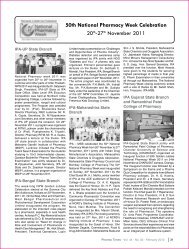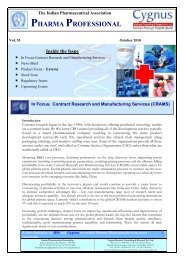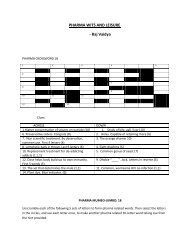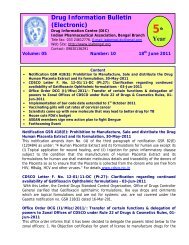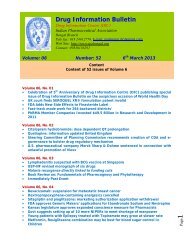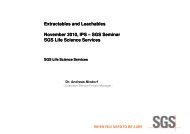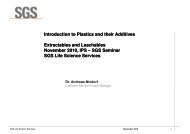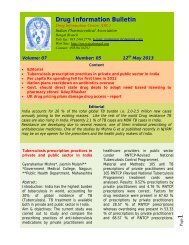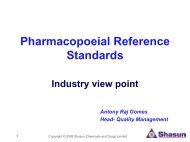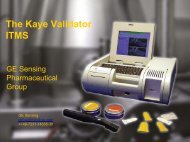71st INTERNATIONAL CONGRESS OF FIP - Indian Pharmaceutical ...
71st INTERNATIONAL CONGRESS OF FIP - Indian Pharmaceutical ...
71st INTERNATIONAL CONGRESS OF FIP - Indian Pharmaceutical ...
You also want an ePaper? Increase the reach of your titles
YUMPU automatically turns print PDFs into web optimized ePapers that Google loves.
A Grand Opening ….<br />
World Congress of Pharmacy and <strong>Pharmaceutical</strong> Sciences 2011<br />
71 st <strong>INTERNATIONAL</strong> <strong>CONGRESS</strong> <strong>OF</strong> <strong>FIP</strong><br />
Theme: Compromising Safety and Quality: A Risky Path<br />
The <strong>71st</strong> World Congress of Pharmacy<br />
and <strong>Pharmaceutical</strong> Sciences of The<br />
International <strong>Pharmaceutical</strong> Federation<br />
(<strong>FIP</strong>), was hosted by India Host Committee<br />
of the <strong>Indian</strong> <strong>Pharmaceutical</strong> Association<br />
(IPA), from September 4 th , 2011 to<br />
September 9 th , 2011 at HICC, Hyderabad.<br />
Governor of Andhra Pradesh - Shri E. S. L. Narasimhan speaking on the occasion. Also seen on the<br />
dias (L - R) Chairman of India Host Committee - Dr. B. Suresh & Past President, IPA - Prafull Sheth.<br />
The 2011 Congress opened with a<br />
monumental visit by the President of India,<br />
Her Excellency, Mrs. Pratibha Devisingh<br />
Patil, accompanied by Governor of Andhra<br />
Pradesh - Shri E. S. L. Narasimhan and<br />
Chief Minister of Andhra Pradesh - Shri N.<br />
Kiran Kumar Reddy. On this occasion,<br />
Following the visit of the President and<br />
other dignitaries, the Assistant-Director<br />
General of the World Health Organization<br />
(WHO), Dr. Nakatani signed the official<br />
WHO-<strong>FIP</strong> Joint Statement on the Role<br />
of the Pharmacist in Tuberculosis Care<br />
Pharma Times - Vol. 43 - No. 10 - November 2011 16<br />
and Control with <strong>FIP</strong> President Dr Michel<br />
Buchmann. This statement will set the stage<br />
for increased pharmacist involvement in<br />
the prevention of and care of patients with<br />
tuberculosis; a timely and relevant issue<br />
considering the spread of tuberculosis in<br />
India. The landmark statement establishes<br />
Chief Minister of Andhra Pradesh<br />
- Shri N. Kiran Kumar Reddy<br />
welcoming the delegates<br />
President of <strong>FIP</strong> - Dr. Michel<br />
Buchmann making the<br />
introductory remarks.<br />
<strong>FIP</strong> Distinguished Practice Award<br />
Dr. Marianne F. Ivey (USA)<br />
<strong>FIP</strong> Lifetime Achievement In<br />
<strong>Pharmaceutical</strong> Practice Award<br />
Dr. Th. (Dick) Tromp (Netherlands)<br />
<strong>FIP</strong> Fellows<br />
Dr. Max Brentano (Switzerland)<br />
Mr. Mehmet Serif Boyaci (Turkey)<br />
Mr. Azubike Okwor (Nigeria)<br />
Prof. Adel Sakr (Egypt)<br />
Dr. Eduardo Savio (Uruguay)<br />
Dr. Régis J.M. Vaillancourt (Canada)<br />
Høst Madsen Medal<br />
Prof. Malcolm Rowland (UK)<br />
<strong>FIP</strong> Honorary Membership<br />
Prof. Tsuneji Nagai (Japan)<br />
Chairman of India Host<br />
Committee - Dr. B. Suresh<br />
welcoming the delegates.
a series of measures to help detect TB,<br />
offer treatment support to TB patients,<br />
and substantially reduce the number of<br />
deaths from TB. This would be achieved<br />
by encouraging the <strong>FIP</strong>’s network of two<br />
million pharmacists and pharmaceutical<br />
scientists around the world to become<br />
fully engaged in national TB care and<br />
control efforts. Speaking at the opening<br />
ceremony, Dr Hiroki Nakatani, WHO<br />
Assistant Director-General for HIV/AIDS,<br />
Tuberculosis, Malaria and Neglected<br />
Tropical Diseases, welcomed the new<br />
accord with <strong>FIP</strong>: “Pharmacists can be the<br />
gatekeepers to vital TB health services.<br />
WHO welcomes the opportunities that<br />
further collaboration with the federation’s<br />
President of IPA -<br />
Dr. C. Gopalakrishna Murty<br />
delivering the vote of thanks.<br />
World Congress of Pharmacy and <strong>Pharmaceutical</strong> Sciences 2011<br />
71 st <strong>INTERNATIONAL</strong> <strong>CONGRESS</strong> <strong>OF</strong> <strong>FIP</strong><br />
Theme: Compromising Safety and Quality: A Risky Path<br />
network of pharmacists will bring in helping<br />
many people with tuberculosis gain early<br />
access to the care and treatment they<br />
need.”<br />
His comments were echoed by Dr Michel<br />
Buchmann, the President of <strong>FIP</strong>: “While<br />
recognizing the broader role of pharmacists<br />
in the development and use of anti-TB<br />
medicines, this Joint Statement focuses on<br />
the role of pharmacists directly involved in<br />
the care of people with TB. The International<br />
<strong>Pharmaceutical</strong> Federation will endeavor to<br />
support WHO and their Member States in<br />
enabling national tuberculosis programmes<br />
and national pharmacy associations to<br />
strengthen their collaboration towards care<br />
Dr. C. Gopalakrishna Murty & Dr. B. Suresh presenting a memento to the President of India.<br />
Prafull Sheth announcing the<br />
<strong>FIP</strong> Fellowships<br />
Prof. T. Nagai receiving the<br />
Honorary Membership from<br />
Dr. Michel Buchmann<br />
Padmashree Dr. Ananda Shankara Jayanta & her troupe presenting recitals of classical <strong>Indian</strong> dance & music<br />
and control of TB and multidrug-resistant-<br />
TB globally.”<br />
This was followed by the awards<br />
presentation ceremony, where the most<br />
prestigious <strong>FIP</strong> awards were presented to<br />
pharmacy professionals from across the<br />
globe. Almost 2000 delegates from over<br />
98 countries convened at Hyderabad for<br />
the program centered on increasing safety<br />
and quality of medicines and patients on a<br />
global level. The delegates were regaled<br />
by stunning classical <strong>Indian</strong> dance and<br />
music recitals by Padmashree Dr. Ananda<br />
Shankara Jayanta & her troupe from<br />
Shankarananda Kalakshetra.<br />
Dr. T. K. Ravi & Dr. Alka Mukne<br />
conducting the inaugural session<br />
Prafull Sheth presented<br />
with <strong>FIP</strong> – IPS Medal<br />
Prafull Sheth,<br />
Past President<br />
of IPA<br />
and current<br />
Vice President<br />
of <strong>FIP</strong><br />
was presented<br />
with the<br />
<strong>FIP</strong>-Industrial<br />
P h a r m a c y<br />
Section (<strong>FIP</strong>-<br />
IPS) Medal at<br />
the IPS business<br />
meeting<br />
Dr. Linda Hakes presenting<br />
the <strong>FIP</strong>-IPS Medal to Prafull<br />
Sheth<br />
held on September 7 th , 2011, during the<br />
Congress. The medal was presented to<br />
Mr. Sheth by Dr. Linda Hakes, Chairperson,<br />
<strong>FIP</strong> – IPS. Mr. Sheth was honored<br />
with this unique distinction for his sterling<br />
contribution to the global pharmaceutical<br />
industry through his continued influence<br />
and impact on industrial pharmacy developments,<br />
over an extended period of<br />
time. On this occasion, Mr. Prafull Sheth<br />
also delivered a lecture on Balancing<br />
Science & Practice : Pharmacy profession’s<br />
Challenge for Inclusive Growth &<br />
Service Delivery.<br />
Pharma Times - Vol. 43 - No. 10 - November 2011 17
Speech of the President of India, Her Excellency Smt. Pratibha Devisingh Patil at the<br />
inauguration of the <strong>71st</strong> World Congress of Pharmacy and <strong>Pharmaceutical</strong> Sciences of<br />
<strong>FIP</strong> on September 4 th , 2011 at HICC, Hyderabad<br />
Ladies and Gentlemen,<br />
I am pleased to inaugurate the World<br />
Congress of Pharmacy and <strong>Pharmaceutical</strong><br />
Sciences 2011 and the <strong>71st</strong> Congress<br />
of the International <strong>Pharmaceutical</strong><br />
Federation (<strong>FIP</strong>), an organization which<br />
will be celebrating the Centenary year of<br />
its establishment next year. I congratulate<br />
the <strong>FIP</strong>, as also the <strong>Indian</strong> <strong>Pharmaceutical</strong><br />
Association who have jointly organized<br />
this Conference, where the theme is<br />
“Compromising Quality and Safety - A<br />
Risky Path”. It is a very appropriate topic,<br />
given that safe and good quality medicines<br />
along with their responsible use, is a very<br />
critical area in the field of healthcare.<br />
Medical science has made tremendous<br />
progress, newer machines, better<br />
technologies and new drugs are now<br />
available. But the other side of the story,<br />
and a matter of concern, is that a very<br />
large part of the world population, mostly<br />
in developing countries has inadequate<br />
or no access to healthcare or essential<br />
medicines at affordable cost. Resultantly,<br />
the mortality rate and disease incidence<br />
is high. The health sector is linked with<br />
creating a better and healthy world. Of<br />
the Millennium Development Goals,<br />
those relating to child health, maternal<br />
health, and combating HIV/AIDS, malaria<br />
and other diseases, are dependent on<br />
providing healthcare. Disease reduces the<br />
capacity to work, and is a major reason that<br />
poor patients borrow, and then get trapped<br />
in the vicious circle of debt and poverty.<br />
How to achieve access to healthcare and<br />
essential good quality medicines for all, at<br />
a reasonable cost, must be an essential<br />
part of any discussion on pharmaceutical<br />
sciences. The developed countries need to<br />
work closely with developing countries, in<br />
addressing healthcare issues and sharing<br />
their expertise and experiences.<br />
In India the development of health<br />
services and infrastructure is one of the<br />
priority areas. The sector is expanding<br />
and has also achieved much. Hospital and<br />
medical facilities in India are an attractive<br />
destination for medical tourism. Our<br />
mission however, is to extend the coverage<br />
of healthcare, particularly amongst our<br />
urban poor and to rural areas. This offers<br />
many opportunities for Public-Private<br />
Partnerships. I do hope that many of you<br />
Pharma Times - Vol. 43 - No. 10 - November 2011 18<br />
World Congress of Pharmacy and <strong>Pharmaceutical</strong> Sciences 2011<br />
71 st <strong>INTERNATIONAL</strong> <strong>CONGRESS</strong> <strong>OF</strong> <strong>FIP</strong><br />
Theme: Compromising Safety and Quality: A Risky Path<br />
present here will come forward to work in<br />
expanding health coverage in India.<br />
Alongwith skilled and dedicated<br />
healthcare providers, treatment with<br />
medicines are one of the most cost-effective<br />
medical interventions known. Most illnesses,<br />
especially infectious diseases, are either<br />
preventable or treatable with medicines. But<br />
it is estimated, that more than 50 percent<br />
of all medicines worldwide are prescribed,<br />
dispensed, or sold inappropriately. 50<br />
percent of patients fail to take them correctly.<br />
This results in health complications. Aware<br />
of the enormity of the task of ensuring the<br />
safe and judicious use of medicines, the<br />
Government of India initiated a National<br />
Pharmacovigilance Programme in July<br />
2010. It is designed to monitor adverse<br />
drug reactions of medicines on the <strong>Indian</strong><br />
population, so that based on data; decisions<br />
can be taken about appropriateness of<br />
medicines.<br />
Measures to improve the rational use<br />
of medicines bring into play the role of<br />
pharmacy professionals, whose role in<br />
recent years, has evolved. New drugs<br />
are being introduced, which include high<br />
tech pharma products, vaccines as well as<br />
new dosage forms and new routes of drug<br />
administrations. Patients now need much<br />
counseling on how to take medicine safely.<br />
Pharmacy is an important component of<br />
the multidisciplinary Health Care Sector.<br />
Pharmacists must have new knowledge and<br />
skills and many countries are introducing,<br />
expanding and undertaking major reforms<br />
in pharmacy education. This must be<br />
accompanied by robust systems to assure<br />
the quality of educational structures,<br />
processes and outcomes. In India the<br />
inflow of pharmacy professionals per<br />
annum is around 41,000 from diploma<br />
institutions and around 50,000 from degree<br />
institutions. The Pharma D. programme<br />
has been introduced, as also the National<br />
Institutes of <strong>Pharmaceutical</strong> Education and<br />
Research (NIPER) have been established<br />
in the country, to focus on pharmaceutical<br />
sciences. Looking at the future, India is<br />
aware of the need to increase the strength<br />
of clinically and technologically trained<br />
pharmacy professionals, to meet growing<br />
requirements, including for its expanding<br />
pharma industry.<br />
Ladies and Gentleman,<br />
The <strong>Indian</strong> pharmaceutical industry<br />
has a wide range of capabilities, and is<br />
already contributing a substantial share to<br />
global production. By 2015, it is expected<br />
to become a U.S. $ 20 billion industry, from<br />
its present turnover of U.S. $ 12 billion. It<br />
is already the third largest in the world, by<br />
volume. <strong>Indian</strong> pharma companies have<br />
an extensive presence in many parts<br />
of the world, and our pharmaceutical<br />
products are known to be of good quality,<br />
safety and efficacy. <strong>Indian</strong> generic drugs<br />
have helped in bringing down the cost of<br />
treatment of various diseases world-wide,<br />
which includes HIV/AIDS.<br />
The pharma industry must respond to<br />
the emerging patterns of diseases, and to<br />
growing concerns about disease causing<br />
agents becoming resistant to existing<br />
drugs. This necessitates increased focus<br />
on research and development, including<br />
in the newer frontiers of medicine like<br />
bio-technology. With its proven IT sector,<br />
demonstrated leadership in bio-technology,<br />
a vast pool of trained personnel and cost<br />
advantages, India can emerge as a<br />
significant player in global pharmaceutical<br />
research. It already has the largest number<br />
of US FDA approved plants outside of<br />
the U.S.A., and is expected to be among<br />
the world’s top five innovative hubs with<br />
contributions of around 50 percent to<br />
drugs discovered worldwide. It has a<br />
competitive cost advantage and a pool
of skilled workforce, of high managerial<br />
and technical competence. Hence,<br />
several MNC pharma companies are<br />
increasingly making India their Research<br />
and Development hub.<br />
The holding in India, of this Conference<br />
on Pharma and <strong>Pharmaceutical</strong> Sciences,<br />
is a recognition of India’s strength in<br />
these. I also believe that we should draw<br />
on the rich resource of our indigenous<br />
knowledge of medicine, and reach out to<br />
those who have effective remedies but<br />
are hesitant to disclose them, and bring<br />
these into broader usage. Producing<br />
some ayurvedic drugs is tedious and a<br />
time-consuming process. A short cut for<br />
their procedure reduces the efficacy of<br />
such a drug. This should not be lost sight<br />
<strong>FIP</strong> AIM Deans Forum<br />
Meeting 2011<br />
The second AIM Deans Forum meeting<br />
was held on 3 rd and 4 th September, 2011<br />
at the <strong>FIP</strong> Congress at Hyderabad.<br />
The purpose of AIM Deans Forum<br />
was to address the issues related to<br />
pharmaceutical education across the globe<br />
and to highlight the importance of social<br />
accountability of pharmacy education and<br />
the best practices of pharmacy. Nearly<br />
30 Deans representing different nations<br />
and continents participated in the two day<br />
deliberations. This year’s programme was<br />
divided in to three symposia. The first<br />
symposium was on “New Schools and<br />
Programmes”; the second symposium was<br />
on “Strategic planning and expanding”;<br />
the third symposium was on “Interaction<br />
and interactive”, respectively. In each of<br />
the symposium 3 to 4 Deans spoke on<br />
their experiences.<br />
Dr Peter Jewesson, Dr Tim Rennie, Dr<br />
Ieva Stupans and Dr Yousif Asiri spoke on<br />
the developments of new schools at Qatar<br />
University, in Namibia, in Australia and in<br />
Saudi Arabia, respectively. The discussion<br />
was focussed on the distance mode of<br />
pharmacy education at Australia.<br />
In the second symposium, Dr Patricia<br />
Acuna-Johnson of Chile, and Dr Bart<br />
Rombaut of Brussels spoke on the best<br />
practices for developing strategies in<br />
South America and European Union,<br />
Paper presentations by<br />
Community Pharmacists at<br />
71 st <strong>FIP</strong> Congress, Hyderabad<br />
World Congress of Pharmacy and <strong>Pharmaceutical</strong> Sciences 2011<br />
71 st <strong>INTERNATIONAL</strong> <strong>CONGRESS</strong> <strong>OF</strong> <strong>FIP</strong><br />
Theme: Compromising Safety and Quality: A Risky Path<br />
of while producing Ayurvedic medicines.<br />
India has much to offer the world in terms of<br />
alternative medicine and its potential must<br />
be tapped. Greater focus is required in this<br />
regard to propagate its efficacy.<br />
It is the responsibility of every healthcare<br />
provider and healthcare organizations in<br />
a country, to ensure that the quality and<br />
safety of medicines are not compromised.<br />
There are instances of spurious drugs,<br />
which are so harmful to health, being<br />
produced. This is a crime and an unethical<br />
practice. So, the theme of this meeting<br />
“Compromising Quality and Safety - A<br />
Risky Path” is important. It should not be<br />
left to the Government alone to identify such<br />
unscrupulous producers, the industry must<br />
also have a wing to find out such practices,<br />
Prof. S. K. Kulkarni (2 nd from right) along with the participants at the <strong>FIP</strong> AIM Deans Forum Meeting.<br />
Also seen in the 2 nd row, extreme right Dr. Bala Prabhakar<br />
respectively. The discussion was focussed<br />
on the practices in European Union and<br />
United Kingdom.<br />
The third symposium addressed the<br />
issues of interaction and interactivity. Dr<br />
Adel Sakr of Egypt spoke on expanding<br />
industry partnerships in his country. Dr S.K.<br />
Kulkarni represented India and he spoke<br />
on Translation approach in pharmaceutical<br />
teaching and training-a new window of<br />
opportunity. The discussion was focussed<br />
on bringing together practice and science-a<br />
case study for India. Dr Maria Bystrin of the<br />
University of Toronto spoke on continuing<br />
professional development.<br />
On the second day, ie; 4 th September,<br />
Participation of community pharmacists<br />
in national or international conferences<br />
has been very rare. But 71 st <strong>FIP</strong> Congress,<br />
Hyderabad was an exception & Over 50<br />
and bring it to the notice of the Government<br />
to take action. The Conference should<br />
look at issues of how to create access<br />
to affordable, quality medicines within a<br />
sound regulatory environment. How can<br />
we bring about paradigm shifts in drug<br />
discovery, development, regulation and<br />
usage of medicines, particularly relevant<br />
to emerging disease profiles? How can<br />
pharmacy education be challenged to meet<br />
the demands of industry, the regulatory<br />
bodies and hospital pharmacists?<br />
With these words I wish all the participants<br />
success in their deliberations.<br />
Thank you.<br />
JAI HIND!<br />
2011 Dr Henri Manasse, the Professional<br />
Secretary of <strong>FIP</strong> spoke at length on<br />
social accountability-an imperative for<br />
all pharmacy curricula. The discussion<br />
was on pharmacists as agents of change<br />
and common competencies in curricula.<br />
Dr Kenneth Roberts of University of<br />
Kentucky spoke on managing up-how to<br />
effectively have influence on university<br />
leaders and funders. On the third day, ie;<br />
5 th September, 2011 Dr Henri Manasse<br />
gave a presentation on how WHO and<br />
<strong>FIP</strong> partnering in addressing health needs<br />
and challenges of the society and global<br />
task force.<br />
- Prof. S. K. Kulkarni<br />
Director, Bombay College of Pharmacy<br />
pharmacists attended the Congress. There<br />
were 30 pharmacists from Maharashtra.<br />
They were well supported by State<br />
Chemist Association & AIOCD. IPA<br />
Pharma Times - Vol. 43 - No. 10 - November 2011 19
Community Pharmacy Division took the<br />
initiative & motivated the pharmacists for<br />
participation as well for paper presentations.<br />
First time ever, in the history of <strong>Indian</strong><br />
community pharmacy, 2 community<br />
Mahadev Patel with a delegate (L-R) Raj Halwai, Sagar Kulkarni,<br />
Manjiri Gharat & Raj Vaidya<br />
Latvian Delegation at the<br />
<strong>FIP</strong> Congress in Hyderabad<br />
As well as being the Congress’ first<br />
visit to India, it was also the first visit there<br />
by the participants from Latvia. As it is<br />
one of the most developed regions in the<br />
pharmaceutical industry we eagerly took<br />
in all the impressions we gained at the<br />
Congress and at the excellently organised<br />
social events that went with it. We took part<br />
in the Congress’ opening ceremony with<br />
great pleasure, which was honoured by<br />
Her Excellency Smt. Pratibha Devisingh<br />
Patil, President of India, who delivered<br />
an important speech to the audience.<br />
In relation to the quality and safety of<br />
medicine, it is clear to everyone that there<br />
is no place for compromise.<br />
This was my ninth participation in the<br />
<strong>FIP</strong> Congress, so I was able to compare it<br />
with other similarly organised congresses<br />
held in various countries around the<br />
world. I mainly took part in the work of the<br />
The 71 st International Congress of<br />
<strong>FIP</strong> held in historic city of Hyderabad and<br />
first time ever in India was truly historic<br />
in many ways. The venue Hyderabad<br />
International Convention Centre, located<br />
near newly evolved Hitec city offered<br />
top class facilities for a global event<br />
besides the magnificence of surrounding<br />
Novotel complex. It was wise of <strong>FIP</strong> to<br />
Pharma Times - Vol. 43 - No. 10 - November 2011 20<br />
World Congress of Pharmacy and <strong>Pharmaceutical</strong> Sciences 2011<br />
71 st <strong>INTERNATIONAL</strong> <strong>CONGRESS</strong> <strong>OF</strong> <strong>FIP</strong><br />
Theme: Compromising Safety and Quality: A Risky Path<br />
pharmacists presented posters. Mr. Sagar<br />
Kulkarni, Yashasri Medical, Kalyan, Mumbai<br />
presented his work on “Implementation of<br />
Good Pharmacy Practices in my Pharmacy:<br />
Sharing of experiences”. His paper was<br />
Left-to-right, Latvian delegates Nora Krauja, Vita Ozoliņa, Ināra Rubene (press),<br />
Ieva Stupāns (a Latvian from Australia), and Inta Saprovska.<br />
Industrial Pharmacy Section (IPS) as well as<br />
being able to enjoy the opportunity for the<br />
purposes of an exchange of experiences<br />
when I was able to visit one of the local<br />
production sites, the Hetero Plant, where<br />
I was made to feel very welcome by the<br />
staff there.<br />
India welcomed us very warmly, and<br />
everyone we talked to or who we cooperated<br />
with was remarkably obliging and helpful.<br />
We greatly enjoyed the sunshine and<br />
Special features of 71 st International Congress of <strong>FIP</strong><br />
venture out of Europe and land into India,<br />
a land of cultural diversity and citadel of<br />
pharmaceutical industry.<br />
The main theme – Compromising safety<br />
and quality - a risky path seemed not as<br />
large as the event. The contemporary<br />
proceedings deserved a rather finer title<br />
like evolving new bench marks for safety<br />
also selected for oral presentation in<br />
Community Pharmacy Section of <strong>FIP</strong>.<br />
The audience received his talk very well<br />
& delegates from African countries/Sri<br />
Lanka appealed to Mr Sagar to help them<br />
to set up GPP in their pharmacies.<br />
Mr Mahadev Patel, Patel Medical,<br />
Mulund, Mumabi presented poster<br />
on “Professionalizing services at my<br />
Pharmacy: Evolving from Medicine vendor<br />
to being an integral part of health care<br />
team”. He received very good response<br />
& there was excellent interaction with<br />
foreign delegates.<br />
These papers were co-authored by<br />
Mr. Nitin Maniar, Mr. Sunil Chavan & Mrs.<br />
Manjiri Gharat.<br />
- Manjiri Gharat<br />
Hon. Secretary, IPA-CPD<br />
the contacts we were able to make<br />
with colleagues from other countries in<br />
Hyderabad, and brought home with us<br />
the information and knowledge that we<br />
had gained in the Congress lectures. The<br />
Congress ended with a beautiful gala<br />
dinner and a wonderfully tasty meal. Surely<br />
we can say that we are looking forward to<br />
the opportunity to travel to India again.<br />
- Inta Saprovska,<br />
Head of IPS Latvia<br />
and quality-path for tomorrows. The<br />
<strong>Indian</strong> <strong>Pharmaceutical</strong> Congress (IPC)<br />
should take a leaf from this august event<br />
in organizing the program.<br />
The touchiest aspect about the event<br />
was the way one would identify oneself.<br />
Identifying oneself with the nation – ‘I am<br />
ABC from United States’ or ‘I am XYZ from<br />
India was a very satisfying experience.<br />
The most significant thing I learnt from the
congress was that industrial pharmacy<br />
and academic pharmacy are among nine<br />
different facets of pharmacy profession<br />
practiced by pharmacists. What I believed<br />
hitherto was generally recognized concept<br />
that community pharmacy, hospital<br />
pharmacy and pharmacy information<br />
services etc only represent pharmacy<br />
practice and that rest is pharmaceutical<br />
sciences. The organization of <strong>FIP</strong> into<br />
Board of <strong>Pharmaceutical</strong> Practice and<br />
Board of <strong>Pharmaceutical</strong>s Sciences meant<br />
that pharmacy science and pharmacy<br />
practice are intertwined and not mutually<br />
exclusive. While the former focuses on<br />
theory, the latter focuses on practical<br />
aspects. It was heartening to learn about<br />
the scope of activities of International<br />
<strong>Pharmaceutical</strong> Students’ Federation<br />
(IPSF) and Young Pharmacists Group<br />
(YPG) from different sessions organized<br />
by them.<br />
The organization of the event was<br />
truly professional. <strong>FIP</strong> had obtained<br />
accreditation for continuing education (CE)<br />
Sessions by <strong>FIP</strong> – Industrial<br />
Pharmacy Section<br />
Kaushik Desai, Chairman of IPA<br />
- Industrial Pharmacy Division and Vice<br />
President of <strong>Indian</strong> <strong>Pharmaceutical</strong><br />
Association was the Session Chair along<br />
with Dr. Michael Anisfeld, Vice President,<br />
Industrial Pharmacy Section (IPS) of <strong>FIP</strong><br />
in the session on ‘Good Manufacturing<br />
Practices: Expectations for the coming<br />
Decade’ on September 8 th 2011.<br />
While speaking on the ‘Need for<br />
education in <strong>Pharmaceutical</strong> Technology in<br />
the coming decade: Industry perspective’,<br />
Mr. Desai touched upon three areas<br />
namely, overview of <strong>Pharmaceutical</strong><br />
Industry, <strong>Indian</strong> Education scenario and<br />
what needs to be done to meet challenges<br />
of next decade. Industry, Academia<br />
and Association will have to play a vital<br />
role in the development of industrial<br />
pharmacists’ skills and knowledge. The<br />
IT applications shall be integrated into<br />
pharmacy education and curriculum<br />
as well. The exposure of Industry and<br />
teachers to emerging and newer trends<br />
in their respective discipline is the need of<br />
the hour. In conclusion, Mr. Desai stressed<br />
the need to start value added courses in<br />
the pharmaceutical technology and gave<br />
World Congress of Pharmacy and <strong>Pharmaceutical</strong> Sciences 2011<br />
71 st <strong>INTERNATIONAL</strong> <strong>CONGRESS</strong> <strong>OF</strong> <strong>FIP</strong><br />
Theme: Compromising Safety and Quality: A Risky Path<br />
for all/most sessions from several countries<br />
like Austria, China, France, Germany,<br />
Japan, Netherlands, Switzerland, UK etc.<br />
The congress would issue a statement<br />
of sessions attendance mentioning the<br />
date and duration upon the request by the<br />
delegate. This was besides the regular<br />
certificate of participation. Each speaker<br />
deliberated on the subject for about 20<br />
to 30 minutes and paid equal attention to<br />
question-answer session. The focus was<br />
on quality and not quantity of audience<br />
and speakers stuck to their task devotedly<br />
irrespective of the number of attendants.<br />
The formalities were reduced to only<br />
essentials like presenting a few slides about<br />
the organizers of the session, statement<br />
of no conflict of interest among speakers<br />
and very brief introduction of the speaker<br />
by chair/co-chair who in many cases also<br />
served as one of the speakers. There were<br />
no bouquets or mementoes offered to the<br />
speakers. The programs started at 9 am<br />
and concluded at 6 pm giving enough time<br />
for the delegates to relax and move around<br />
in the evenings.<br />
Kaushik Desai Dr. T. V. Narayana<br />
his insight on what is needed to be done<br />
both by Industry and Academia to meet the<br />
challenges of next decade.<br />
Mr. Kodandaram, Drug Controller<br />
of Andhra Pradesh share his thoughts<br />
on ‘<strong>Indian</strong> Drug Legislation and GMP<br />
inspections in India’. Mr. Kodandaram<br />
informed the august audience about<br />
recent steps taken by <strong>Indian</strong> regulators<br />
in bringing systems and new procedures<br />
to monitor clinical trials in India. India will<br />
need separate skills for medical devices<br />
which are another upcoming development.<br />
The <strong>Indian</strong> Pharmacopeia will have work<br />
towards inclusion of specifications for<br />
flavours, colours and taste masking resins<br />
to maintain the uniformity in standards. Mr.<br />
Kodandaram gave insight into changes<br />
expected in <strong>Indian</strong> drug legislations to meet<br />
the future requirements and bring India in<br />
par with global standards.<br />
Brief introductory session for the<br />
first timers was a welcome initiative.<br />
<strong>FIP</strong> showcase after the opening of the<br />
exhibition provided perfect opportunity<br />
to learn about <strong>FIP</strong> sections and special<br />
interest groups (SIGs) and forums. The<br />
exhibition included posters from each<br />
of these <strong>FIP</strong> bodies. The exhibition was<br />
good but did not offer much for people<br />
from pharma industry. The welcome party<br />
for all on first day and sectional dinners<br />
held separately for each section provided<br />
wonderful events for socializing.<br />
The Congress brought pharmacy<br />
professionals from India closer to their<br />
professional colleagues from rest of the<br />
world and helped them share mutual love<br />
and respect. The <strong>Indian</strong> <strong>Pharmaceutical</strong><br />
Association, a constituent member of <strong>FIP</strong><br />
and India Host Committee has added<br />
a feather in their cap by successfully<br />
organizing the historic global event.<br />
Dr. Jayant B Dave<br />
Hon. Secretary - IPA Gujarat State Branch<br />
Mr. T Rajamannar from Sun Pharma<br />
Advanced Research Centre shared his<br />
expertise on the ‘Future developments<br />
in ICH – Development & manufacture of<br />
drug substances.’ He explained ICH Q11<br />
guidelines in detail in a simple language<br />
and what is expected to change from the<br />
current scenario after implementation of<br />
this draft guideline.<br />
Dr. P Khadgapathi, Director,<br />
Pharma, Hetero Group elaborated on<br />
‘<strong>Indian</strong> <strong>Pharmaceutical</strong> Development<br />
– the challenges of the coming decade’<br />
in his presentation. He outlined the<br />
various developmental challenges during<br />
the development of pharmaceutical<br />
product and the drug substance. He<br />
also mentioned that the industry will<br />
have to address the issues with regard<br />
to new technological advances and<br />
simultaneously tackle the infrastructure<br />
development issues to meet the future<br />
requirements.<br />
Dr. T V Narayana, Chairman,<br />
Education division of IPA talked on<br />
‘Need for education in <strong>Pharmaceutical</strong><br />
Technology in the coming decade:<br />
Education perspective.’ While concurring<br />
with Mr. Desai on several aspects,<br />
he detailed the initiative taken by<br />
Pharmacy Council of India, the <strong>Indian</strong><br />
Pharma Times - Vol. 43 - No. 10 - November 2011 21
(R-L) Dr. Mike Anisfield, Ram Banarase,<br />
Dr. Khadagapathi & Kaushik Desai<br />
regulatory agency to set standards of<br />
education in India, in framing of the new<br />
curriculum for pharmacy education both for<br />
undergraduate and post graduate degree<br />
courses. He also mentioned that although<br />
due importance is given in new proposal<br />
for Continuous Improvement Programmes<br />
(CEP) for teachers; the industry shall come<br />
forward and support this initiative.<br />
In addition to above, there were other<br />
experts from globe who shared their<br />
expertise during the session. Dr. Michael<br />
Anisfeld kick started the session by<br />
presenting on ‘GMP Expectations for the<br />
coming decade – where the GMP world<br />
is heading for 2020.’ He outlined the<br />
important features of GMPs followed by<br />
number of countries and gave update on<br />
recent developments in PIC. He shared<br />
his thoughts on his predictions for 2020.<br />
The important being incorporation of ICH<br />
Guidelines with GMPs, merger of ICH and<br />
PIC and having one global harmonized<br />
GMP by 2020.<br />
Dr. Tom Sam, Secretary of IPS,<br />
<strong>FIP</strong> shared his expertise on ‘Quality by<br />
Design –Implications for drug development<br />
and manufacture.’ He simplified QbD<br />
The 71 st <strong>FIP</strong> Congress witnessed<br />
an unprecedently high participation of<br />
<strong>Indian</strong> technocrats, scientists & leaders<br />
as resource persons. With sessions on<br />
topics as diverse as pharmacogenomics,<br />
pharmaceutical manufacturing, regulatory<br />
guidelines, pharmacoeconomics, military<br />
& emergency pharmacy, education,<br />
social & administrative pharmacy, public<br />
health, careers in pharmacy and so on, the<br />
Congress had something for everybody.<br />
Here we give you a glimpse of the<br />
presentations made by a few of the <strong>Indian</strong><br />
speakers in the Congress …<br />
Pharma Times - Vol. 43 - No. 10 - November 2011 22<br />
World Congress of Pharmacy and <strong>Pharmaceutical</strong> Sciences 2011<br />
71 st <strong>INTERNATIONAL</strong> <strong>CONGRESS</strong> <strong>OF</strong> <strong>FIP</strong><br />
Theme: Compromising Safety and Quality: A Risky Path<br />
Delegates at Hetero during the industrial tour Dr. P. Khadagapathi presenting a bouquet<br />
to Dr. Mike Anisfield. Also seen on the left,<br />
terminology by saying that it is nothing but<br />
all about Science and Risk management.<br />
By taking example from report published by<br />
IBM on drug design, he explained the QbD<br />
principles and how it can help in smooth<br />
development of a product.<br />
Mr. Bruss Rose, representing US FDA<br />
India office talked about ‘FDA expectations<br />
and experiences when inspecting India drug<br />
and API manufacturers.’ Mr. Ross gave<br />
statistical information about the total number<br />
of inspections done by FDA in US and<br />
outside US. He explained in detail the top<br />
ten deficiencies observed during inspections<br />
and asked industry experts to take a note of<br />
these observations in preparing their sites<br />
for future inspections. FDA India office is<br />
established to help <strong>Indian</strong> manufacturer<br />
in clearing their doubts and educate the<br />
industry professionals in the new regulatory<br />
developments.<br />
The IPS <strong>FIP</strong> session ended with highly<br />
interactive question – answer session with<br />
closing remarks from Michael Anisfeld.<br />
===============================<br />
A industrial tour was organized to M/s Hetero<br />
Drugs formulation manufacturing site for the<br />
members of Industrial Pharmacy Section<br />
<strong>Indian</strong> voice in the Congress<br />
(contributed by Dr. J. B. Dave, Raj Vaidya, Dr. T.K. Ravi & Manjiri Gharat)<br />
Dr. Bhojraj Suresh, Chairman, India Host<br />
Committee & President, Pharmacy Council<br />
of India<br />
Mapping a new vision – Translating ideas<br />
into practice<br />
“I extend greetings from one million pharmacists<br />
from India. We require ultimate competence<br />
level in pharmacists at all levels. In<br />
India, we have 6 lakhs pharmacists manning<br />
community pharmacy that are qualified but<br />
not trained in all aspects. We should not delink<br />
pharmacy practice and pharmacy science.<br />
What is good in developed countries<br />
Kaushik Desai<br />
of <strong>FIP</strong>. The members had a chance to<br />
see the world class manufacturing oral<br />
solid dosage manufacturing facility. On<br />
behalf of Dr. Parthasarathy Reddy, MD<br />
and Chairman of Hetero group of cos.<br />
Dr. P Khadgapathi welcomed the IPS<br />
members representing various countries<br />
and gave brief introduction about the<br />
company before tour. The members<br />
were highly appreciative of the facility,<br />
arrangements and the hospitality offered<br />
by Hetero. The visit was facilitated by<br />
Industrial Pharmacy Division of <strong>Indian</strong><br />
<strong>Pharmaceutical</strong> Association.<br />
===============================<br />
Dr. C Gopalakrishna Murty, President of<br />
IPA and Mr. Kaushik Desai, Vice President<br />
and Chairman of Industrial Pharmacy<br />
Division of IPA were felicitated by Michael<br />
Anisfeld, Vice President, <strong>FIP</strong> Industrial<br />
Pharmacy Section during annual general<br />
body meeting of IPS for their active role in<br />
helping IPS in identifying expert speakers<br />
from India, the organization of IPS sessions<br />
and the industrial tour.<br />
- Kaushik Desai<br />
Chairman, IPA- Industrial Pharmacy<br />
Division & Vice-President, IPA<br />
may take long<br />
time for achieving<br />
in developing<br />
countries. We<br />
need to develop<br />
Systems and<br />
A s s o c i a t i o n s<br />
to share wisdom<br />
and translate<br />
ideas into<br />
practice. Pharmacy<br />
practice<br />
regulations are in the offing in India”<br />
were the opening remarks of
Dr. B. Suresh. During his talk, Dr. Suresh<br />
charted out the roadmap for actualizing<br />
the potential of pharmacy profession in<br />
the developing nations.<br />
Subodh Priolkar, General Manager,<br />
Colorcon - Asia Pacific Pvt. Ltd. & Past<br />
President - IPA<br />
Ensuring Quality & Safety in Outsourcing<br />
Subodh Prio<br />
l k a r g a v e a n<br />
overview of the<br />
current & projected<br />
future global outsourcing<br />
market.<br />
After dwelling on<br />
the key drivers for<br />
outsourcing, Mr.<br />
Priolkar emphasized<br />
on the need<br />
to select the right outsourcing partner &<br />
the risks & challenges associated with the<br />
process. He emphasized the role of key<br />
activity metrics in lowering the associated<br />
risks & the importance of Quality Management<br />
System in building excellence as an<br />
outsourced partner is concerned.<br />
Raj Vaidya, Chairman, IPA-Community<br />
Pharmacy Division & Vice-President, IPA<br />
Managing risks, reducing costs - What is<br />
the impact on the individual pharmacist?<br />
R a j V a i d y a<br />
talked about how<br />
working Pharmacists,<br />
risks and<br />
costs in the pharmacy<br />
are a triad,<br />
each one affecting<br />
the other two<br />
In the pharmacy<br />
generally there are<br />
high prescription<br />
numbers, and a compulsion for the pharmacist<br />
to check each one of them for errors,<br />
drug interactions, and that medicines<br />
are correctly dispensed. There is a need<br />
to provide counselling or instructions to<br />
some or many of these prescriptions – and<br />
spend sufficient time with the patient to<br />
guide him on proper use of medicines.<br />
Besides, pharmacist may be needed to<br />
advise patients on general well-being and<br />
OTC medications.<br />
Dr. T. K. Ravi, Member, IPA- Education<br />
Division<br />
Can technology be useful in developing<br />
countries to improve teaching and<br />
learning?<br />
World Congress of Pharmacy and <strong>Pharmaceutical</strong> Sciences 2011<br />
71 st <strong>INTERNATIONAL</strong> <strong>CONGRESS</strong> <strong>OF</strong> <strong>FIP</strong><br />
Theme: Compromising Safety and Quality: A Risky Path<br />
Dr. T. K. Ravi discussed<br />
the present status<br />
of teaching - learning<br />
process and the<br />
technologies adopted<br />
in these countries. The<br />
challenges to adopt<br />
these technologies and<br />
involvement of regulatory<br />
authorities like<br />
councils, accreditation<br />
boards, professional associations, universities<br />
and other professional stakeholders for<br />
monitoring and suggesting the inclusion of<br />
newer technologies(teaching using Smart<br />
boards, Computer Aided learning, Simulated<br />
learning, Audience response System,<br />
E-Learning, etc.) for teaching learning and<br />
evaluation of expected outcomes.<br />
Manjiri Gharat, Hon. Secretary, IPA- CPD<br />
& Chairperson, IPA DOTS TB Pharmacist<br />
Project<br />
India Round Table,organized by SEARPharm<br />
Forum<br />
Manjiri Gharat<br />
presented the DOTS<br />
T B P h a r m a c i s t s<br />
project, Mumbai &<br />
the proposed national<br />
scale up of this innovative<br />
public-private<br />
partnership. She, in<br />
detail spoke about<br />
the benefits of this<br />
pharmacists model<br />
for the National TB Control Programme<br />
& for the society. She acknowledged the<br />
socio-professional work of all participant<br />
pharmacists who were doing this noble work<br />
without any financial incentives.<br />
Jagganath Shinde, President, All India<br />
Organisation of Chemists & Druggist<br />
(AIOCD)<br />
India Round Table,organized by SEARPharm<br />
Forum<br />
J a g g a n a t h<br />
Shinde talked about<br />
the drug distribution<br />
system in India and<br />
how it works. He<br />
elaborated about AI-<br />
OCD’s professional<br />
inititative such as<br />
continuing education<br />
of pharmacists,<br />
computerization of<br />
pharmacies, etc. He emphasized that<br />
AIOCD’s vision was to develop a professional<br />
pharmacist.<br />
Archana Mudgal, Secretary, Pharmacy<br />
Council of India<br />
Vision of Regulatory bodies & four stages<br />
of growth<br />
Regulatory body is<br />
a statutory body & has<br />
a pool of talents from<br />
all facets that helps<br />
it in drawing policy<br />
and implementing the<br />
same. Statutory body<br />
requires visionary<br />
leadership that is ever<br />
evolving. Vision leads<br />
to mission and then<br />
establishment of strategies. There are<br />
four stages of growth - One, Retention<br />
of present; two, forecast based planning;<br />
three, global competence and four,<br />
strategic management. The first step<br />
involves accreditation of curriculum &<br />
institutions, adding new skills, continuing<br />
education program, planning bridge<br />
courses etc. The second stage is based<br />
on increased per capita income, increased<br />
literacy rate, increased awareness,<br />
increased quality of services and increase<br />
in need of professional excellence. Third<br />
stage involves mutual recognition of<br />
strengths & the fourth stage is based<br />
on requirement of environment of self<br />
regulation and self realization.<br />
Dr. Arun S. Nanivadekar, Medical<br />
Consultant<br />
Clinical practice, Clinical Research &<br />
Public Health –A Continuum<br />
Dr. Arun Nanivadekar discussed<br />
in detail the aspects<br />
involved in<br />
clinical practice,<br />
research & public<br />
health. Research<br />
in clinical practice<br />
is the need<br />
of the hour and<br />
this would include<br />
focus on relevant<br />
data, emphasis<br />
on accuracy & completeness, standard<br />
methods & procedures, databases for<br />
pooling, co-ordination of planning & data<br />
management, networking of research oriented<br />
practices by therapeutic areas and<br />
regulatory acceptance subject to some<br />
conditions of standardization. There is a<br />
Pharma Times - Vol. 43 - No. 10 - November 2011 23
need to evolve a new model for clinical<br />
trial where research can be based on clinical<br />
practice with good networking. Model<br />
should be based on Relton c et al model<br />
published in BMJ 2010:340: C 1066<br />
Dr. D. B. A. Narayana, Unilever Ltd.<br />
Quality of herbal medicines with regards to<br />
safety – Authentication, contamination &<br />
adulteration problems: Need for sustainable<br />
management of medicinal plants<br />
Dr. D. B. A. Narayana<br />
outlined the safety<br />
& quality issues associated<br />
with herbal<br />
products. He gave an<br />
update on pharmacopoeialspecifications<br />
of the various<br />
standard texts & the<br />
challenges associated<br />
with the newer tools of herbal drug<br />
evaluation. He concluded with discussing<br />
techniques of sustainable medicinal plants<br />
management.<br />
Dr. Michel Buchmann presenting a memento to Dr. B. Suresh.<br />
Also seen Dr. Gopalakrishna Murty & Ton Hoek.<br />
Mrs. Kamal Midha (left) with<br />
Mrs. B. Suresh<br />
(seatedL-R) S.D. Joag with Dr. & Mrs. Gopalakrishna Murty. (Standing<br />
L -R) Mrs. & Mr. Jayapal Reddy, Mr. & Mrs. Vasu Rao & Dr. Alka Mukne<br />
Sunitha C. Srinivas<br />
Pharma Times - Vol. 43 - No. 10 - November 2011 24<br />
World Congress of Pharmacy and <strong>Pharmaceutical</strong> Sciences 2011<br />
71 st <strong>INTERNATIONAL</strong> <strong>CONGRESS</strong> <strong>OF</strong> <strong>FIP</strong><br />
Theme: Compromising Safety and Quality: A Risky Path<br />
Associate Professor, Pharmacy Administration<br />
and Practice, Faculty of Pharmacy<br />
Empowering Women Pharmacists<br />
“In today’s world Goddesses are more<br />
powerful than Gods. The plight of women in<br />
developing countries is very encouraging.<br />
I have witnessed this in transition of my<br />
career from pharmaceutical chemistry<br />
in India to DIC in Karnataka to public<br />
health department in South Africa. I have<br />
realized that one has to establish goal or<br />
vision at every stage in one’s journey and<br />
that time is the essence – right time, right<br />
message & so on. We need more women as<br />
working pharmacists”, were some of Sunita<br />
Srinivas’s reflections in her session.<br />
Krishan M. Ella, Bharat Biotech International<br />
Ltd<br />
Biosimilars – Challenges & opportunities<br />
The regulators are faced with different<br />
challenges while dealing with biogenerics.<br />
Even if the end product & efficacy is same,<br />
Closing Dinner<br />
The Congress closed with a sparkling dinner where the delegates let<br />
their hair down to the tunes of some of the most glitzy Bollywood song &<br />
dance razzmatazz. In the midst of spectacular fireworks & carnival-like<br />
ambience, coupled with scrumptious seven course spread, the symbolic<br />
flag for the next <strong>FIP</strong> Congress marking the centennial celebrations of<br />
<strong>FIP</strong>, was formally handed over to the team from Amsterdam, marking<br />
the formal closing of the 7-day long mega meet.<br />
there are differences in adverse/toxic<br />
reactions due to differences in impurities<br />
and adventitious antigens. The US leads<br />
in biologic products. EMEA guidelines for<br />
biogenerics are very useful reference.<br />
Even after execution of material transfer<br />
agreement, moral rights of organs /cell<br />
lines etc rest with the innovator company.<br />
The position of Generic <strong>Pharmaceutical</strong><br />
Association is that changes occur not due<br />
to variations in SOP but due to inherent<br />
biologic variation. The <strong>Indian</strong> regulatory<br />
scenario is that all biologics are treated<br />
as new drug and have to comply with<br />
requirements of Schedule Y. One requires<br />
performing only toxicity, phase I & III<br />
trials. The phase II trial is not required<br />
as innovator has established the dosage<br />
already. Alternatively, phase II & III can be<br />
combined. Biobetter products which claim<br />
better purity and safety due to improved<br />
technology require phase II trials as well.<br />
Although, bioinnovators will take little<br />
longer than generics, it is prudent to go for<br />
NDA than ANDA type of products.<br />
Dr. Renuka Datla (L-R) S. D. Joag, Prafull Sheth, Mrs. Sheth & Mrs. Vinod Shah<br />
Delegates enjoying themselves<br />
Dr. T. V. Narayana with Mrs.Narayana
(L-R) S. D. Joag, Dr. C. Gopalakrishna Murty, Dr. B. Suresh, Prafull Sheth,<br />
J. A. S. Giri & Jaypal Reddy at the press conference<br />
Dr. C. Gopalakrishna Murty addressing the invitees at the <strong>FIP</strong><br />
Council Dinner, as Dr. B. Suresh looks on<br />
World Congress of Pharmacy and <strong>Pharmaceutical</strong> Sciences 2011<br />
71 st <strong>INTERNATIONAL</strong> <strong>CONGRESS</strong> <strong>OF</strong> <strong>FIP</strong><br />
Theme: Compromising Safety and Quality: A Risky Path<br />
Dr. B. Suresh welcoming the invitees to the<br />
<strong>FIP</strong> Council Dinner<br />
Dr. Michel Buchmann with Dr. Vinod Shah Ton Hoek, CEO-<strong>FIP</strong><br />
AIOCD booth at the exhibition<br />
Dr. Divakar Goli along with volunteers at the IPA booth in the exhibition Dr Rao Vadlamudi<br />
Pharma Times - Vol. 43 - No. 10 - November 2011 25
Dr. H. G. Koshia (2nd from right) along with Dr. K. Veerasuriya<br />
(2nd from left), along with other dignitaries<br />
Group of pharmacists Registration Counter<br />
Pharma Times - Vol. 43 - No. 10 - November 2011 26<br />
World Congress of Pharmacy and <strong>Pharmaceutical</strong> Sciences 2011<br />
71 st <strong>INTERNATIONAL</strong> <strong>CONGRESS</strong> <strong>OF</strong> <strong>FIP</strong><br />
Theme: Compromising Safety and Quality: A Risky Path<br />
Student volunteers with IHC members<br />
Delegates during the Congress<br />
Dr. T.V. Narayana with media representatives


